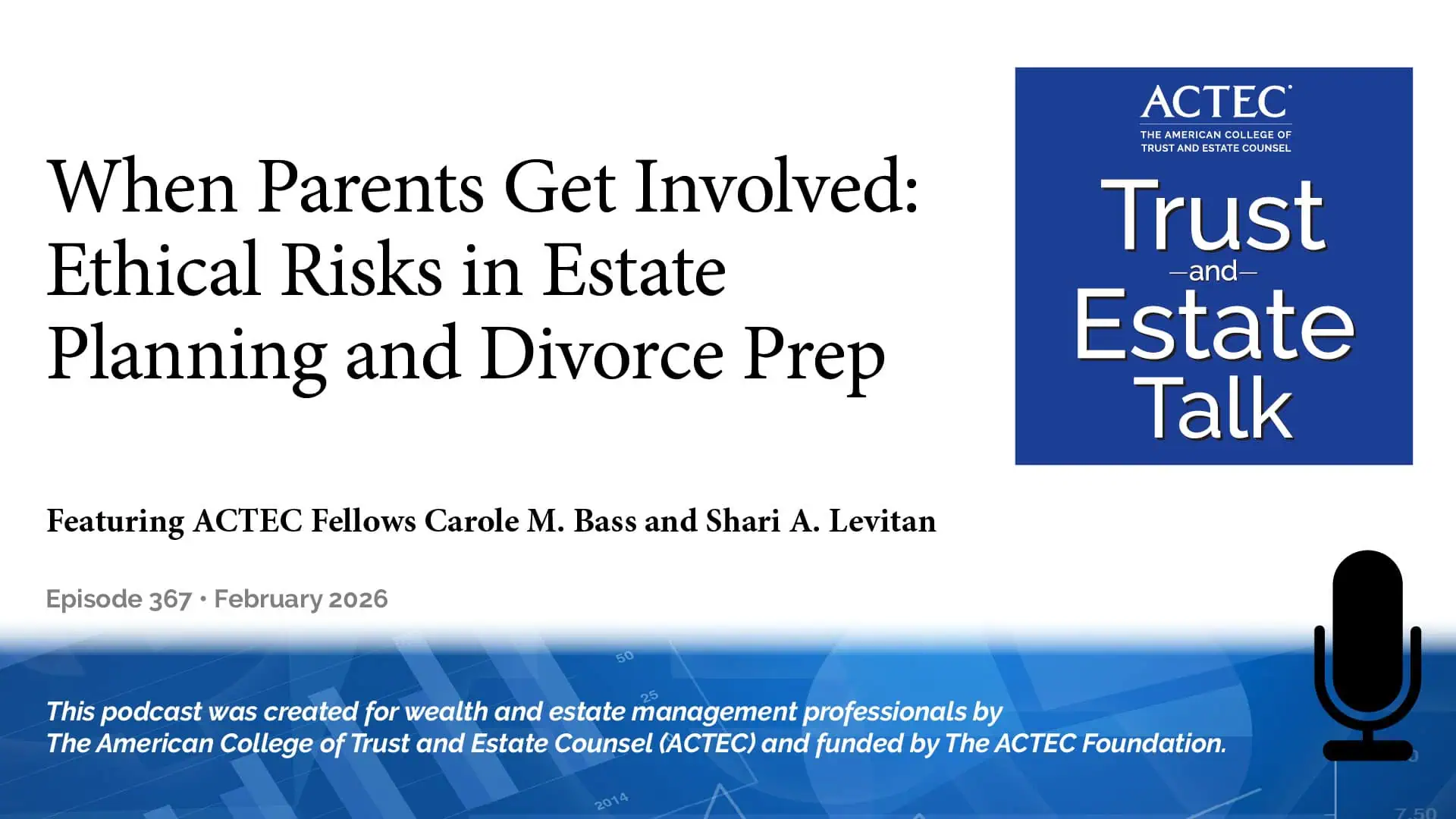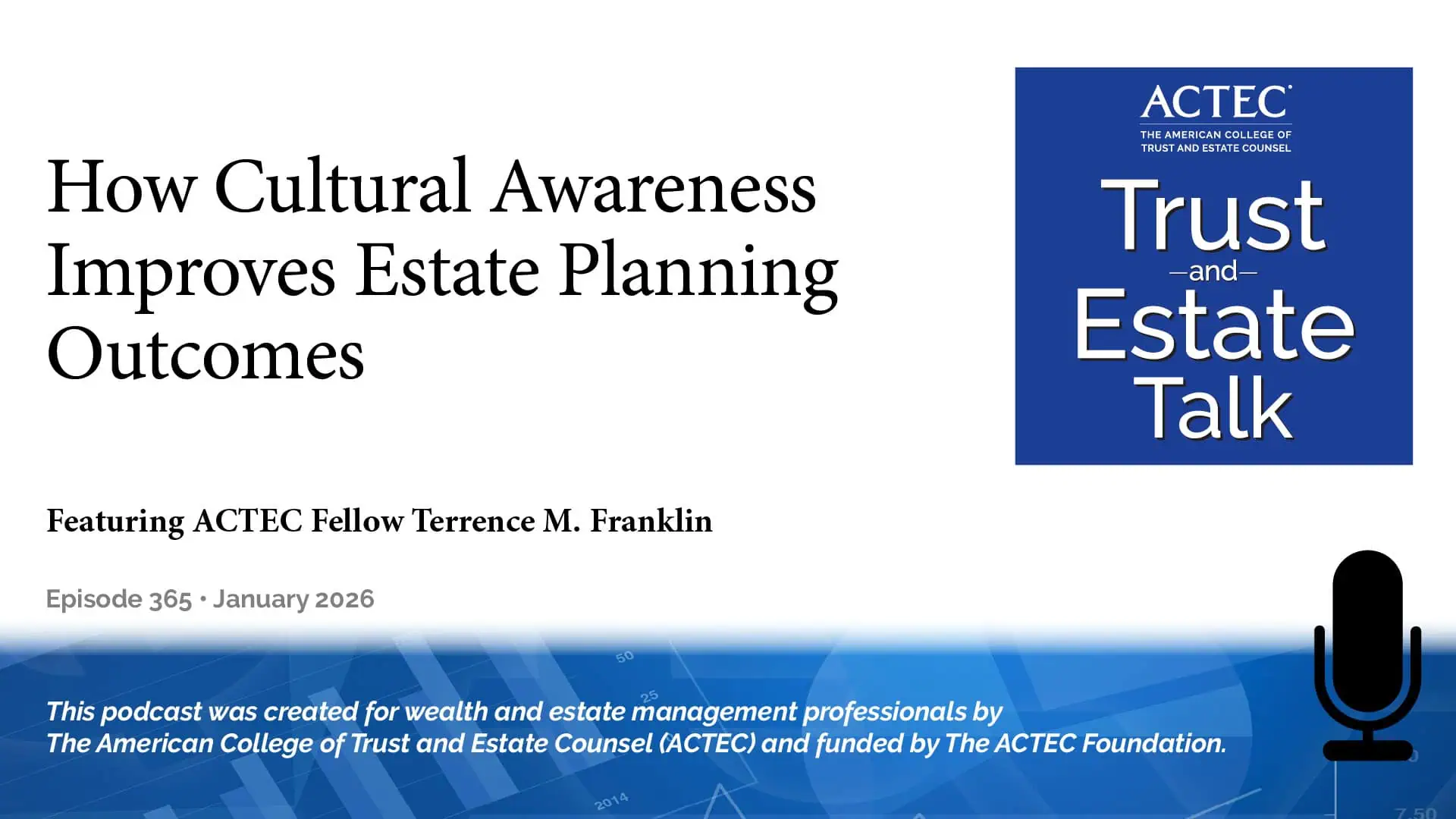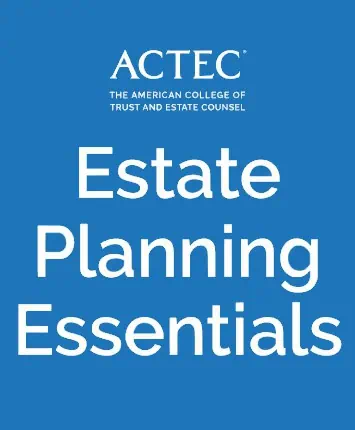Restricted Charitable Gifts: Practical Suggestions
“Restricted Charitable Gifts: Practical Suggestions,” that’s the subject of today’s ACTEC Trust and Estate Talk.
Transcript/Show Notes
This is Randy Harris, ACTEC Fellow from New York City. Disputes involving charitable gifts and bequests are common, and there is a lack of coherence in the law governing restricted gifts, following the enactment of UPMIFA (Uniform Prudent Management of Institutional Funds Act) and the UTC in many states. In light of this, what are some of the techniques that donors, charities, and their advisors can employ to address issues involving restrictions on charitable gifts?
ACTEC Fellows Professor Nancy A. McLaughlin from Salt Lake City, Utah, and Jeff Thede of Portland, Oregon, join us to discuss practical suggestions for donors and charities regarding making and accepting restricted charitable gifts. Welcome, Nancy and Jeff.
Donor Suggestion: Reasonable Restrictions and Flexibility
Nancy A. McLaughlin: Thanks, Randy. We’re going to begin with practical suggestions for a donor who wants to try to ensure that a charity will comply with the restrictions placed on a gift. Our first suggestion is that the donor should ensure that the restrictions are reasonable and give the charity some flexibility to respond to changing conditions. Now, you might think that this suggestion is more relevant to charities, but donors need to think about this because the reality is courts are much more likely to uphold gift restrictions over the long term if they are viewed as reasonable.
Donor Suggestion: Restricted Gifts in Trust
Jeffrey C. Thede: The Uniform Trust Code now includes a donor standing provision permitting the donor of a charitable gift and trust to enforce the charitable restrictions. So at the common law, restricted charitable gifts were treated as charitable trusts, not in the tax entity sense, but just as a matter of common law. So consider making restricted gifts in trust –it is arguable that even a restricted gift made during the donor’s lifetime from the donor’s Revocable Living Trust is still a trust under the UTC and confers donor standing just by doing that one simple mechanism.
Donor Suggestion: Reserve Standing in the Gift Instrument
Nancy A. McLaughlin: Another option, if you’re not under the UTC, is to reserve standing in the gift instrument for the donor and specify others, like the donor’s descendants or a family LLC, and to also require that the charity agree not to object to standing. Now, most people think this technique works, but some worry that standing is an issue for courts to decide, and a donor’s attempt to confer standing might not be enforceable. Also, even if a grant of standing in a gift instrument is enforceable, the charity may not agree to it, donors are mortal, and the descendants and others who are named in the gift instrument might not care enough to spend the time or money required to sue to enforce the gift after the donor’s death. So, it is best for a donor to also consider our other suggestions.
Donor Suggestion: Attorney General Involvement in Charities
Jeffrey C. Thede: To follow up on that a little bit, I’m in the state of Oregon, which is a small state, but we have a very active charitable activity section at the Attorney General’s office. Our Attorney General has not formally agreed that one can confer charitable standing by contract, but it at least ensures that the donor or members of the donor’s family might have a seat at the table if there are disputes or negotiations.
Donor Suggestion: Make Restricted Gifts in Installments
Another idea is to consider making a restricted charitable gift in installments, either directly or through a fiduciary, or maybe even an intermediate entity, such as a Donor-Advised Fund (DAF). The idea is that if a large restricted charitable gift is made in installments, then as the funds of each installment are expended, it’s like a trial run so that the donor can actually see whether the charity is complying with those restrictions.
Donor Suggestion: Revocable Charitable Pledges
Another idea is what I call a “revocable charitable pledge.” That is a pledge made by a donor during a lifetime, which by its terms is fully revocable by the donor and becomes irrevocable only when the donor passes away. That, too, enables the donor to take a look and see what the charity does with the funds as each payment is made.
Donor Suggestion: Override Extrajudicial Modification Provisions
Nancy A. McLaughlin: Yet another suggestion is for the donor to provide in the gift instrument that the extrajudicial modification provisions of the UTC or UPMIFA shall not apply to the gift. Now, the UTC expressly provides that its uneconomic trust provision is a default rule that can be overridden in the trust instrument. And although UPMIFA is silent regarding whether its extrajudicial modification provision is a default rule, it doesn’t hurt to try and override it.
Donor Suggestion: Include a Reversion Clause
Jeffrey C. Thede: Another idea to be used cautiously is to include in the gift instrument a reversion to the donor or the donor’s successors if the charity, for whatever reason, is unable or unwilling to comply with the restrictions. But you must exert extreme caution because in order to obtain an income tax charitable deduction, any chance of a reversion has to be “so remote as to be negligible,” which is almost a de minimis standard. So if you’re dealing with a donor who does not have a federally taxable estate, one might question whether we even care if it’s going to be a gift made at death. But be careful because, in some states, like Oregon, we have a very punitive estate tax. In Oregon, there’s only a $1 million dollar exemption and the tax rates go as high as 16%, and it’s very rare to deal with a donor of a restricted charitable gift in Oregon who does not have an Oregon taxable estate.
Donor Suggestion: Gift Over to Another Charity
Nancy A. McLaughlin: So, our last suggestion is for the donor to provide for a “gift over” to another charity if the initial charity fails to comply with the gift restrictions. A “gift over” encourages the initial charity to comply with the donor’s restrictions and it also encourages the second charity to serve as a watchdog over the gift. This “gift over” technique has worked very effectively with regard to the Gardner Museum in Boston. Isabella, the donor, made a gift of her home and valuable artwork to trustees to be used as a museum. And she provided that nothing in the museum can be permanently changed. And if it is, the collection is to be sold and all of the proceeds are payable to Harvard University. Isabella’s instructions have been adhered to for over 100 years and it’s rumored that Harvard sends someone over to the Gardner Museum periodically just to check things out.
Charity Suggestion: Discern Donor’s Objective
Okay, we’re going to turn now to our practical suggestions for charities. And our first suggestion is for the charity to discern the donor’s primary and secondary objectives. A quick example of why this is important is the current controversy over a bequest to the Orlando Museum of Art, subject to a restriction that it be used by the museum to add to its permanent collection. Well, the museum is strapped for cash and it’s asked the court to remove the restriction and allow it to use the funds to support its existing collection. In other words, it wants to use the funds for its general operations. The daughters of the deceased donor are not happy. They think the museum is violating their mother’s intent. Now, this controversy could have been avoided had the mother’s advisor discerned whether her primary intent was to benefit this particular museum, even if some of the funds were to be used for its general operations or, alternatively, if she intended the funds to be used solely to acquire new artwork, whether by this museum or another similar museum.
Charity Suggestion: Importance of Good Drafting
Jeffrey C. Thede: Good drafting is critical in many if not most, disputed cases involving restricted charitable gifts, with a little bit of foresight and better drafting. I think it’s arguable that these problems could be avoided. So, it’s critical early on to discuss with the donor potential problems in the future and negotiate for some flexibility to adapt to changing conditions with or without court approval.
Charity Suggestion: Contractual Variance Powers
I’m a big fan of what I’ll call a “contractual variance power.” Under the community foundation regulations, community foundations must have the power to vary or modify restrictions that become unlawful, impracticable, unlawful or incapable of fulfillment. I’m a fan of negotiating to include at least the limited power of variance in the gift instrument, which would permit the charity decades or centuries in the future to modify these restrictions to fit a little better.
It is critical, however, in any case to ensure that that provision is specifically in the agreement. Going back to community foundations, community foundations under the tax laws must have a power of variance in the articles and bylaws of the organization. But even if that is the case, one should assume that that power is going to be exercisable against the objections of the donor’s family, only if it is specifically included in the instrument.
Going back to Oregon, for example, my community foundations have a gentle person’s agreement with the Department of Justice to the effect that we will not use the power of variance to bypass or trump MIFA, and instead we’ll only use it in what I’ll call administrative matters without first obtaining the consent of the Department of Justice.
Charity Suggestion: Negotiate Un-Naming Rights
Nancy A. McLaughlin: Another suggestion for a charity is when the charity is accepting a gift subject to a naming restriction, the charity should negotiate for the inclusion of un-naming rights in the gift instrument. Why is this? Well, because many of us are familiar with instances where a donor has fallen from grace and it would be harmful to the charity to continue to use the donor’s name.
Charity Suggestion: Pick Your Plaintiffs
Jeffrey C. Thede: The next suggestion I think of as: pick your plaintiffs. If you’re working with a charitable organization that is considering a modification, whether it is a unilateral modification under a variance power- whether it’s a UTC petition, whether it’s under UPMIFA- it’s important to check with your donor or if the donor’s deceased members of the donor’s family, not only for good donor relations but also hopefully to nip in the bud any objections. Whether or not members of the donor’s family have technical standing, if you have a disputed case, it’s nice to grease the skids and make sure that there are no objections, at least from the donor’s side.
Charity Suggestion: Adopt a Gift Acceptance Policy
Nancy A. McLaughlin: This next suggestion should be obvious for charities; a charity should adopt a gift acceptance policy that requires board approval before major restricted gifts can be accepted. And of course, the policy should also address issues like those we have been discussing, including un-naming rights and negotiating for flexibility where possible, as Jeff pointed out.
Charity Suggestion: Just Say No
Jeffrey C. Thede: Last but not least, just saying no, never be afraid to decline a restricted charitable gift if you consider it to be — to use a technical term — wonky.
Randy Harris: Thank you, Nancy and Jeff, for that very useful presentation.
Additional Info
Latest ACTEC Trust and Estate Talk Podcasts

When Parents Get Involved: Ethical Risks in Estate Planning and Divorce Prep
When parents join prenup or divorce planning, ethical risks follow. ACTEC Fellows explore privilege, conflicts, and protecting the attorney-client relationship.

Useful But Overlooked Trusts: A Planner’s Guide to When and How to Use Them
Explore overlooked trusts—including HEETs, alimony, voting, and blind trusts—and when estate planners should use them to address complex client needs.

How Cultural Awareness Improves Estate Planning Outcomes
How cultural awareness improves estate planning outcomes, with insights on the racial wealth gap and strategies for more effective, inclusive client guidance.



